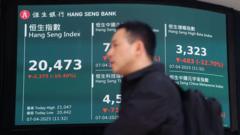Major Asian markets have experienced drastic drops due to escalating fears surrounding U.S. tariffs and their anticipated ripple effects on the region's economy. As investors react to the potential for a trade war, forecasts suggest an increased likelihood of U.S. recession, further impacting Asian exports.
Asian Markets in Turmoil Amid Rising Tariff Fears

Asian Markets in Turmoil Amid Rising Tariff Fears
A significant decline across Asian stock markets has been triggered by new tariffs implemented by the U.S., signaling potential economic downturns.
---
Asian stock markets are experiencing significant turbulence as the repercussions of U.S. President Donald Trump's newly announced tariffs continue to affect global economies. Major indexes, ranging from Shanghai to Tokyo and Sydney to Hong Kong, faced steep declines as trading opened on Monday, with one analyst describing the situation as a "bloodbath."
Countries in Asia, highly reliant on manufacturing for international markets, are directly feeling the impact of these tariffs. This region's vulnerability is heightening concerns over a possible trade war that could incite an economic slowdown, or worse, a recession in the United States. By midday, Japan’s Nikkei 225 had plummeted by 6%, with Australia's ASX 200 dropping 4%, and South Korea's Kospi declining by 4.7%.
As trading resumed after a public holiday, mainland China, Hong Kong, and Taiwan experienced increased pressure with the Shanghai Composite falling more than 6%, while the Hang Seng Index and Taiwan Weighted Index dropped around 10%. Julia Lee, Head of FTSE Russell, pointed out that the tariffs are contributing to inflation expectations and recession fears, prompting Goldman Sachs to raise its prediction of a U.S. recession occurring within the next year to 45%, up from an earlier estimate of 35%. JPMorgan revised its forecast to suggest a 60% chance of a global recession.
The ripple effect of the U.S. tariff hike is particularly severe for Asian nations, many of which are heavily dependent on exports to the U.S. For instance, Vietnam and Bangladesh now face tariffs set at 46% and 37%, respectively. Prominent U.S. companies produce numerous goods in Vietnam, including major brands like Nike and Lululemon, while Bangladesh contributes approximately $8.4 billion worth of garments annually to the U.S. market.
Frank Lavin, former Undersecretary for International Trade, emphasized that Asia bears more than its share of this economic turmoil due to its extensive supply chains to the U.S. Following Trump's tariffs announcement, the global stock market chaos intensified as China retaliated, leading to a sharp decline in U.S. stock indexes, marking significant losses across markets worldwide, inclusive of a 5% drop in the UK’s FTSE 100—its most substantial decline in five years.
With futures indicating further declines, analysts predict the global stock market rout is far from over. Trillions of dollars have evaporated in value since the introduction of these sweeping tariffs, targeting goods from numerous countries, including essential trading partners like China and Vietnam. As the situation develops, the economic ramifications for the entire Asian region remain a growing concern.
Asian stock markets are experiencing significant turbulence as the repercussions of U.S. President Donald Trump's newly announced tariffs continue to affect global economies. Major indexes, ranging from Shanghai to Tokyo and Sydney to Hong Kong, faced steep declines as trading opened on Monday, with one analyst describing the situation as a "bloodbath."
Countries in Asia, highly reliant on manufacturing for international markets, are directly feeling the impact of these tariffs. This region's vulnerability is heightening concerns over a possible trade war that could incite an economic slowdown, or worse, a recession in the United States. By midday, Japan’s Nikkei 225 had plummeted by 6%, with Australia's ASX 200 dropping 4%, and South Korea's Kospi declining by 4.7%.
As trading resumed after a public holiday, mainland China, Hong Kong, and Taiwan experienced increased pressure with the Shanghai Composite falling more than 6%, while the Hang Seng Index and Taiwan Weighted Index dropped around 10%. Julia Lee, Head of FTSE Russell, pointed out that the tariffs are contributing to inflation expectations and recession fears, prompting Goldman Sachs to raise its prediction of a U.S. recession occurring within the next year to 45%, up from an earlier estimate of 35%. JPMorgan revised its forecast to suggest a 60% chance of a global recession.
The ripple effect of the U.S. tariff hike is particularly severe for Asian nations, many of which are heavily dependent on exports to the U.S. For instance, Vietnam and Bangladesh now face tariffs set at 46% and 37%, respectively. Prominent U.S. companies produce numerous goods in Vietnam, including major brands like Nike and Lululemon, while Bangladesh contributes approximately $8.4 billion worth of garments annually to the U.S. market.
Frank Lavin, former Undersecretary for International Trade, emphasized that Asia bears more than its share of this economic turmoil due to its extensive supply chains to the U.S. Following Trump's tariffs announcement, the global stock market chaos intensified as China retaliated, leading to a sharp decline in U.S. stock indexes, marking significant losses across markets worldwide, inclusive of a 5% drop in the UK’s FTSE 100—its most substantial decline in five years.
With futures indicating further declines, analysts predict the global stock market rout is far from over. Trillions of dollars have evaporated in value since the introduction of these sweeping tariffs, targeting goods from numerous countries, including essential trading partners like China and Vietnam. As the situation develops, the economic ramifications for the entire Asian region remain a growing concern.





















